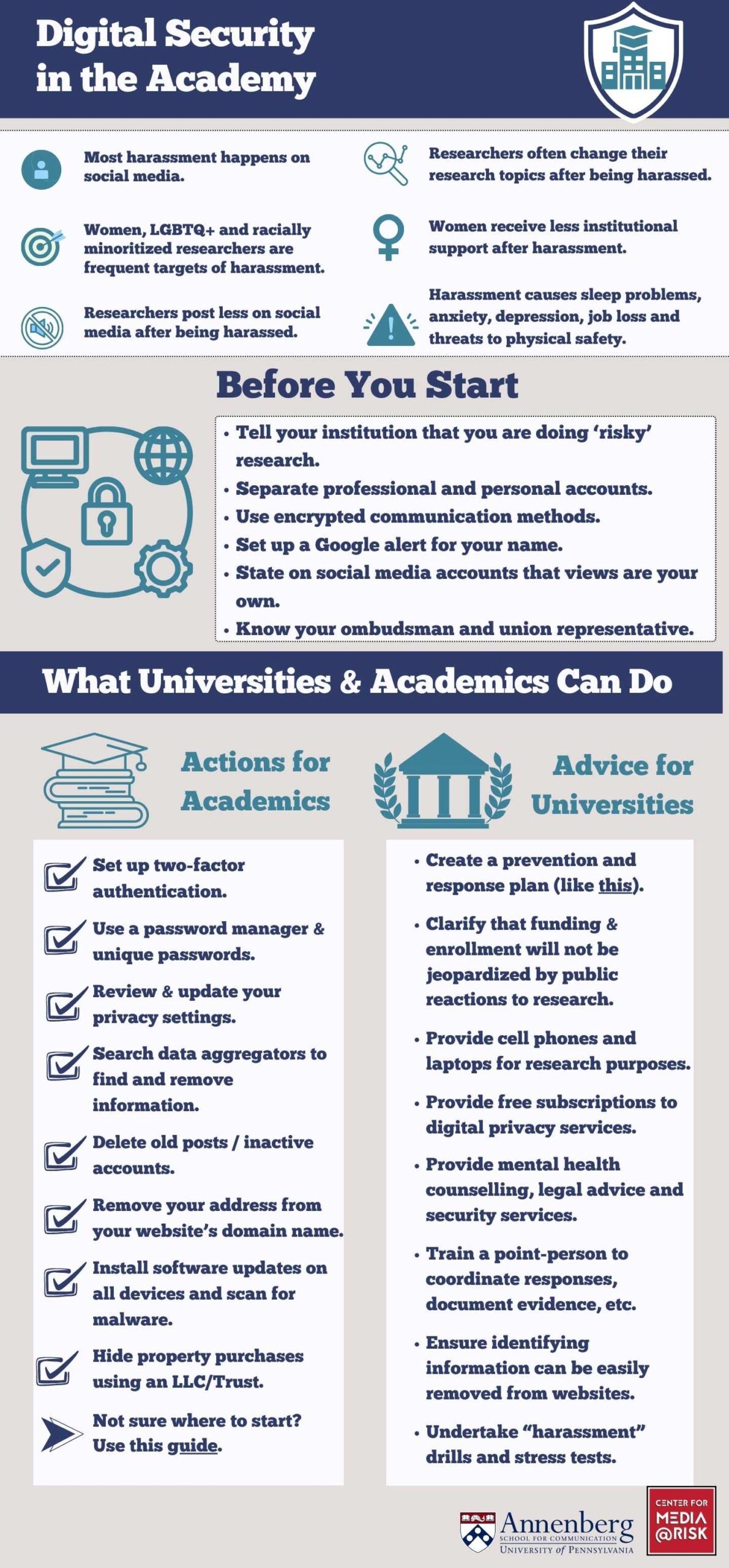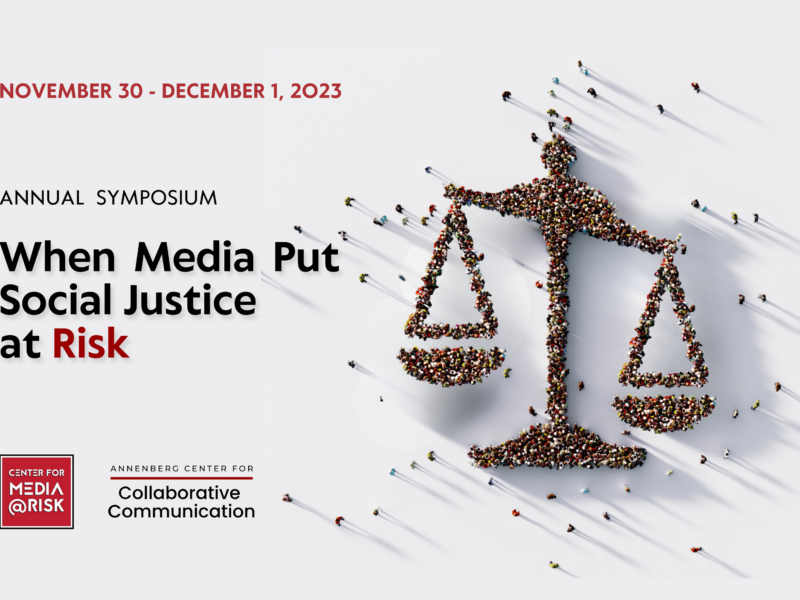Researchers are experiencing unprecedented levels of online harassment designed to intimidate, silence, and discredit them. Researchers now navigate the competing demands of building a public profile and protecting their privacy online. Most harassment takes place via social media platforms that algorithmically promote sentiments of outrage, misinformation and social division. The burden of protecting researchers’ privacy should fall on social media platforms, but universities also have a responsibility to protect their staff and students. After a targeted attack begins, the situation can spiral fast, so it’s important for researchers to take actions that enhance their digital security now. This infographic illustrates the state of the problem and suggests actions they can take to bolster their digital security and actions universities can take to improve their response to harassment.
Infographic written by Center for Media at Risk Steering Committee Member Sophie Maddocks.

Further Resources
https://eos.org/opinions/how-scientists-can-safeguard-themselves-online
https://github.com/opendigitalsafety/Digital-Safety-for-Open-Researchers
https://www.globalwitness.org/en/campaigns/digital-threats/global-hating/
https://www.aaup.org/issues/fighting-targeted-harassment-faculty
https://facultyfirstresponders.com/resources-workers/
https://www.femtechnet.org/csov/lock-down-your-digital-identity/
https://www.takebackthetech.net/be-safe/safety-toolkit
https://gameshotline.org/online-free-safety-guide/#Preventing-Doxxing
References
Barlow, Charlotte, and Imran Awan. 2016. “You Need to Be Sorted Out with a Knife: The Attempted Online Silencing of Women and People of Muslim Faith within Academia.” Social Media+ Society 2 (4): 1–11. doi:10.1177/2056305116678896.
Blizard, Lida Marie. 2016. “Faculty Members’ Perceived Experiences of Cyberbullying by Students at One Canadian University: Impact and Recommendations.” International Research in Higher Education 1 (1): 107–124. doi:10.5430/irhe.v1n1p107.
Cassidy, Wanda, Chantal Faucher, and Margaret Jackson. 2014. “The Dark Side of the Ivory Tower: Cyberbullying of University Faculty and Teaching Personnel.” Alberta Journal of Educational Research 60 (2): 279–299.
Dickson-Swift, V., James, E. L., Kippen, S., & Liamputtong, P. (2008). Risk to researchers in qualitative research on sensitive topics: Issues and strategies. Qualitative Health Research, 18(1), 133– 144.
Eslen-Ziya, Hande, and Alberta Giorgi, ed. 2022. Populism and Science in Europe. Cham: Palgrave MacMillan.
Gosse, Chandell, George Veletsianos, Jaigris Hodson, Shandell Houlden, Tonia A. Dousay, Patrick R. Lowenthal, and Nathan Hall. 2021. “The Hidden Costs of Connectivity: Nature and Effects of Scholars’ Online Harassment.” Learning, Media and Technology 46 (3): 264–280.
Hande Eslen-Ziya, Alberta Giorgi & Ceren J. Ahi (2023) Digital vulnerabilities and online harassment of academics, consequences, and coping strategies. An exploratory analysis, Feminist Media Studies, DOI: 10.1080/14680777.2023.2281268
Lee-Treweek, G., & Linkogle, S. (2000). Danger in the field: Risk and ethics in social research. Psychology Press.
Lee, Raymond M. (1993). Doing research on sensitive topics. London: Sage.
McCosker, H., Barnard, A., & Gerber, R. (2001). Undertaking Sensitive Research: Issues and Strategies for Meeting the Safety Needs of All Participants. Forum Qualitative Sozialforschung / Forum: Qualitative Social Research, 2(1).
Moncur, W. (2013, April). The emotional wellbeing of researchers: considerations for practice. In Proceedings of the SIGCHI Conference on Human Factors in Computing Systems (pp. 1883-1890). ACM.
Nölleke, Daniel, Birte Leonhardt, and Folker Hanusch. 2023. “The Chilling Effect: Medical Scientists’ Responses to Audience Feedback on Their Media Appearances During the COVID-19 Pandemic.” Public Understanding of Science 32 (5)
Oksanen, Atte, Magdalena Celuch, Rita Latikka, Reetta Oksa, and Nina Savela. 2022. “Hate and Harassment in Academia: The Rising Concern of the Online Environment.” Higher Education 84 (3): 541–567. doi:10.1007/s10734-021-00787-4.
Pollard, A. (2009). Field of screams: difficulty and ethnographic fieldwork. Anthropology Matters, 11(2). Online here
Shandell, Houlden, Jaigris Hodson, George Veletsianos, Chandell Gosse, Patrick Lowenthal, Tonia Dousay, and Nathan C. Hall. 2022. “Support for Scholars Coping with Online Harassment: An Ecological Framework.” Feminist Media Studies 22 (5): 1120–1238.
Sümer, Sevil, and Hande Eslen-Ziya. 2023. “Academic Women’s Voices on Gendered Divisions of Work and Care: Working Till I Drop… Then Dropping.” European Journal of Women’s Studies 30 (1): 49–65. doi:10.1177/13505068221136494.

